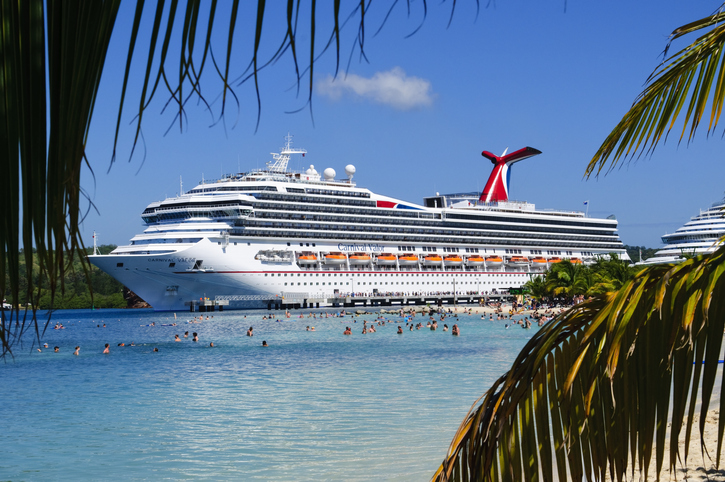ii view: Carnival posts big loss, but shares up 33%
No visibility and an expected 2020 loss, so should investors sell the rally?
20th March 2020 11:52
by Keith Bowman from interactive investor
No visibility and an expected 2020 loss, so should investors sell the rally?

First-quarter results ending 29 February 2019
- Revenue up 2.1% to $4.8 billion
- Net loss of $781 million compared to a profit of $336 million for Q1 2019
- Loss per share of $1.14 compared to earnings of $0.48 for Q1 2019
- As of mid-March, advanced bookings for the rest of 2020 are meaningfully lower
Guidance:
- Coronavirus will have a material impact on results and liquidity
- Unable to provide an earnings forecast – expects a net loss for 2020
ii round-up:
Unsurprisingly, coronavirus hit cruise ship operator Carnival (LSE:CCL) today flagged a dive into the red, but the shares have risen and are now 33% above the 606p record low recorded yesterday morning.
It said: "Given the uncertainty of the situation, the corporation is currently unable to provide an earnings forecast, however it expects a net loss on both a US GAAP and adjusted basis for the fiscal year ending November 30, 2020."
As of mid-March, advanced bookings for the rest of 2020 are "meaningfully lower" than the year before and at much lower prices.
The spread of the coronavirus from China to Europe and much of the rest of the world over recent weeks has seen Carnival previously suspend voyages for between 30 and 60 days.
Operating just over 100 ships, Carnival shares are down nearly 80% year-to-date. A bigger drop than fellow travel and leisure companies such as International Consolidated Airlines Group (LSE:IAG) (-64%), easyJet (LSE:EZJ (-59%) and Premier Inn owner Whitbread (LSE:WTB) (-53%).
Morgan Stanley estimates that the ship operator is losing $600 million for every month its operations are suspended.
At the end of February, Carnival, whose brands include Cunard, Seabourn and Princess Cruises, had $11.7 billion of funds available.
Management noted that all of its assets, with the exception of $6 billion, are available to pledge as collateral.
UBS highlighted that at its year-end, it had a tangible book value of $21 billion with $38 billion in property and equipment.
Positively surprising analysts, first half bookings for 2021 are only slightly below 2020. The shares rose by around 8% in UK morning trading.
ii view:
As with airlines, cruise companies are cyclical – as in subject to swings in the economy – and open to an array of other factors such as fuel prices, accidents and geopolitical tensions, making their share prices often highly volatile. You can now add coronavirus to the list.
Longer term trends, such as ageing populations and the desire for multi destination holidays still provide some positives, although the damage to long-term demand for cruise breaks as a result of the coronavirus is yet to be fully gauged.
For investors, a suspension of the dividend payment looks a near certainty. On a valuation basis, a low single-digit price/earnings (PE) ratio and a price-to-net asset value of less than one point, suggest clear value.
But valuation metrics are now secondary to funding issues, and are almost impossible to predict with any accuracy, especially with operations suspended. Carnival does look to have some time on its side, but it is still difficult to put a figure on the coronavirus impact. The shares are only for nimble traders and those investors willing to accept high risk and unprecedented uncertainty.
Positives:
- Bookings are still being made for 2021
- Oil has plummeted, potentially lowering fuel costs
Negatives:
- Groups finances are under pressure with operations suspended
- Consumer desire to cruise could be permanently damaged
The average rating of stock market analysts:
Hold
These articles are provided for information purposes only. Occasionally, an opinion about whether to buy or sell a specific investment may be provided by third parties. The content is not intended to be a personal recommendation to buy or sell any financial instrument or product, or to adopt any investment strategy as it is not provided based on an assessment of your investing knowledge and experience, your financial situation or your investment objectives. The value of your investments, and the income derived from them, may go down as well as up. You may not get back all the money that you invest. The investments referred to in this article may not be suitable for all investors, and if in doubt, an investor should seek advice from a qualified investment adviser.
Full performance can be found on the company or index summary page on the interactive investor website. Simply click on the company's or index name highlighted in the article.